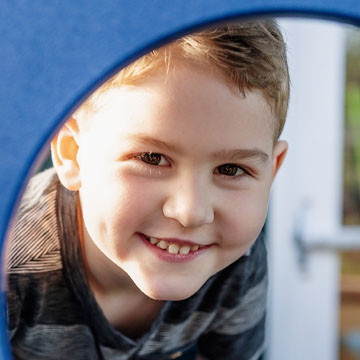Visit Vale Health Marketplace?
You are leaving balladhealth.org to visit Vale Health’s Wellness Marketplace.
Disclaimer: Ballad Health does not sponsor, endorse or recommend any product or resource listed in the marketplace.

Ridge loves playing outdoors, chasing animals on his family’s farm and breakdancing. He also dreams of being a dinosaur trainer and is rarely seen without a T-rex figure in his hand. But three years ago, when a stubborn fever slowed him down, his mother, Shea, knew something wasn’t right.
She took him to his pediatrician, who checked him out and ran bloodwork. When the doctor returned, he told Shea that Ridge needed to go immediately to the emergency room at Niswonger Children’s Hospital. “He said it was either anemia or leukemia,” Shea recalls. “I don’t even remember the 30-minute drive from Greeneville to Johnson City. I was just so numb.”
“They just became family to us. He had a nurse, Summer, who he adores. He’d say, ‘Summer spoils me,’ and I’d say, ‘Yes she does!’”
What she does remember is the sinking feeling in her gut that said, “The doctor’s right. Something’s wrong with Ridge.” When they arrived at Niswonger Children’s Hospital, Shea’s fears were confirmed when they diagnosed Ridge with leukemia.
That was Friday evening. By Sunday, they were loaded up in an ambulance for what Shea recalls was a “long and bumpy ride” to St. Jude Children’s Research Hospital in Memphis. Once they arrived, doctors immediately began prepping Ridge for treatment, placing his port and diagnosing him with acute lymphoblastic leukemia (ALL), a cancer of the bone marrow and blood. Most children with ALL are cured of their disease after treatment, but the road to recovery is long.
Ridge spent three months in Memphis before he was able to return home to Whitesburg, Tennessee. Over the next two years and eight months, Ridge received chemotherapy treatment alternating between the hospital in Memphis and St. Jude Affiliate Clinic at Niswonger Children’s Hospital in Johnson City, much closer to home.
“It just becomes a part of your life, going to the clinic or to the hospital in Memphis,” Shea recalls. “And Ridge would actually kind of look forward to going and seeing everyone. And, of course, the treasure box at Niswonger Children’s Hospital is added incentive. What 3- and 4-year-old doesn’t want to get in the treasure box every week?” The treasure box, Shea explains, “is graciously filled by all kinds of amazing people and organizations that donate toys” for young patients to choose from.
Ridge would receive treatment through a port in his chest, which they began calling his “superpower,” Shea says. “So, after he got his superpower accessed, then he could get his toy from the treasure box.” During these treatments, Ridge began feeling like himself again and wowing doctors and staff with his energy and breakdancing skills.
“They just became family to us,” she says. “He had a nurse, Summer, who he adores. He’d say, ‘Summer spoils me,’ and I’d say, ‘Yes she does!’”
Last September, shortly after his fifth birthday, Ridge received his last round of treatment and was luckily deemed cancer-free. His “superpower” port was removed, but Shea reassured him that he didn’t need it anymore because he had “turned into a superhero.”
Their visits to Niswonger Children’s Hospital are less frequent now, but the memories of Ridge’s long-fought battle remain. “The one thing I held onto this entire time is how well Ridge has handled all this with ease, even when he doesn’t feel well, he still pushes through. He’s still dancing and laughing and singing,” Shea says. “Children really do have this resilience that we seem to lose as adults. There’s so much we can learn from them.”
The Niswonger Children’s Network is dedicated to improving the health and future of the Appalachian Highlands through expert pediatric care so that we can share more heartwarming stories like Ridge’s.
Read more Niswonger Children’s Stories here.